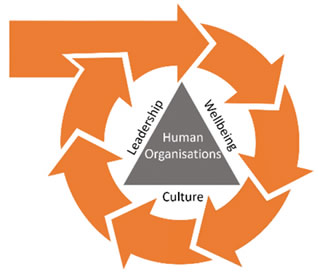The Human Organisation
The Human Organisation
“A culture in which everyone could overcome their own internal barriers to change and use errors and vulnerabilities as prime opportunities for personal and company growth.” – Robert Kegan in Everyone Culture: Becoming a deliberately developmental organisation.
About
Human organisations are ‘well’ organisations. Healthy vibrant cultures in which people are inspired to bring out the best possible versions of themselves.
In human organisations, people perform at their best without being coaxed or bribed to do so. Instead of reverting to immature behaviours of blame and justification when they come to work, they see themselves as well-rounded adults whose task is to make a meaningful contribution and to help others do likewise. Human organisations are ‘well’ organisations that are on a deliberate and focused developmental and cultural evolutionary pathway towards full spectrum consciousness.
There are two central threads that are the woven through the foundations of a human organisation:
Connection – Connection to self, connection to each other, connection to purpose and vision and connection to the people they serve; and
Accountability – Accepting and embracing accountability to self, each other, the reality (role, team, goal, project, organisation) and holding self and others to account.
There is a new leadership required that puts personal leadership (which includes the practices of self-care, expression and reflection) at the very core and demands a fresh approach to leadership development.
The result is far more significant contributions from many more people, and a lot less wasted time and emotional energy. The result is greater success in traditional business measures (e.g. profitability) as well as improved wellbeing and sustainable human potential.
Evolving Leaders equips leaders to thrive in a complex, ambiguous and uncertain world. This enables them to drive the human change that makes cultural change possible, which in turn builds healthy, human organisations – organisations that embrace change, achieve sustainable results and in which the pursuit of profitability is balanced by a greater sense of purpose.
What a human organisation looks like
Some of the characteristics you’re likely to see in a human organisation include:
- Customers feel listened to and their needs are meet at a level beyond their expectations because employees deeply care and feel cared for and supported by the organisation.
- Leadership is less about position than it is about mindset and behaviour. Everyone in the organisation is capable of being recognised as a leader through the way they behave and the choices they make, through supporting others and taking personal responsibility rather than resorting to blame, justification and denial. No one is seen as a leader unless they demonstrate leadership in this way, regardless of their position or title.
- Purpose driven: there is a clear and central ‘why’ that is harvested and activated by the people for the people. It is a grounded source of energy and focus that clarifies, inspires and informs decisions, action and behaviour.
- People are motivated through feeling valued. There is an alignment between what matters to them, the work they do and the workplace culture.
- Connection – real, human connection – with courage and compassion are at the heart of everything that is done within the organisation and for those it serves. Get Connected
- People feel empowered to make choices. High levels of confidence, personal awareness, and accountability exist throughout the organisation.
- People are held to account – They know what is expected of them in their roles and how they ‘show up’ and there are efficient and effective practices and leadership capability to manage this effectively.
- People take responsibility for their own development in a culture of learning and growing.
- People feel a sense of belonging. It feels safe for people to fully show up as who they are and make a meaningful contribution with their unique skills, strengths and preferences. The workplace and its practices are diverse and inclusive and team members experience high levels of psychological safety which results in higher levels of team performance.
- People are highly engaged, feeling a greater sense of connection with their own sense of purpose, with their colleagues and as co-contributors to the organisation’s success in terms of profitability, wellbeing and benefit to the community.
- Internal divisions and turf wars are minimised. Shared values and purpose provide the framework for conversations, decision-making and behaviour. Strategy, culture, purpose and wellbeing are aligned.
- People listen to one another.
- Innovation and creativity are well understood, practiced and regarded as ways the organisation can ‘separate itself from the crowd’.
- Reflective practices are woven into the fabric of the organisation. This may include specific mindful moments in meetings, the way performance conversations are had, allocated time and expectations for people to build reflective practice into their weekly rhythm.
- Time and space to think and learn are valued. The space is created to allow people to get to know each other and to reflect on the learning from projects and other experiences they encounter in their day to day. This becomes a part of the daily, weekly, monthly and annual rhythm.
Where it starts
The shift towards a human organisation begins with accelerating the development of leaders and bringing new awareness to the leadership team about the possibilities of such an organisation. We help leaders to better understand the visible and invisible forces in the organisational eco-system that both help and hinder its progress, then co-create a road-map for cultural evolution.
Contact us to discover how we can help you to grow a ‘human’ team or organisation.
Blog post “What is a human organisation anyway?”
“I believe we can change the world if we start listening to one another again. Simple honest human conversation. Not mediation, negotiation, problem-solving debate or public meetings – simple truthful conversation where we each have a chance to speak, we feel heard and we listen well.”
– Margaret Wheatley, author of Finding Our Way: Leadership For an Uncertain Time
P: +61 425 717 659
E: nicola@evolvingleaders.com.au
Melbourne, Australia
Copyright © Evolving Leaders
Site by: urbanweb.com.au



